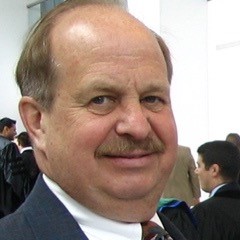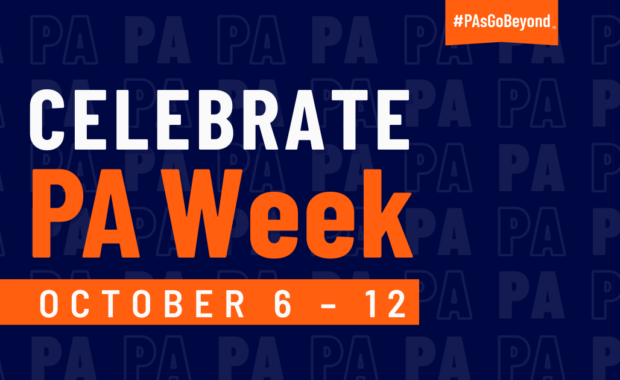Caring for Those Behind Bars Becomes PA’s Lifelong Profession
PA Publishes Book on 35 Years of Experience in Corrections
September 14, 2018
By Dave Andrews
Few people can say they’ve never had a bad day at work.
So, it might seem hard to believe that after working for more than 35 years in the New York State Department of Corrections, PA Bohdan “Ben” Darnobid never once “clocked out” after a hard day’s work feeling somewhat dejected.

But Darnobid genuinely maintains that each day throughout his career was rewarding, largely because of the unique work environment and challenging caseload.
“There’s never a dull moment when working with convicted felons inside a maximum security prison,” said Darnobid, who provided care to countless murderers, rapists, and drug dealers, among many other criminals who had a knack for deceit.
The greatest challenge about prison healthcare, Darnobid said, is determining which patients truly need medical care, and which ones are faking — typically looking for prescription drugs, an all-too-common routine among prisoners.
He had to learn early on how to connect with his patients, deal with volatile personalities, and see through the various lies and exaggerations he’d constantly hear. But those challenges only fueled his motivation.
“At the end of every day, I could always feel confident in knowing I was helping those who are among the most in need of our support,” Darnobid said.
Choosing a Different Path
Many of his experiences working as a prison PA are chronicled in his recently self-published book, “Prison Doc, Thirty-Five Years.” Not only does it illustrate many of the bizarre behaviors he witnessed, it also depicts how far the PA profession has evolved over the last 40 years.
When Darnobid graduated from the Long Island University PA School back in 1978, the profession was still finding its footing within the medical field. He vividly recalls the night after graduation when he and some of his fellow graduates went out to celebrate: “We jokingly asked ourselves, ‘What the heck is a PA, and are we ever going to find jobs to pay off our student loans?’”
It wasn’t long before they all had several job interviews lined up, and each quickly found his or her career path. However, Darnobid chose a slightly different route.
Though he had multiple interviews and felt very confident about his job prospects, one job posting piqued his interest the most: Sing Sing Correctional Facility in Ossining, New York, was seeking a full-time PA.
“I didn’t know anything about corrections, so for the heck of it, I called up the [hiring manager],” Darnobid said. “He told me I’d get to work Monday through Fridays, 7 a.m. to 3 p.m., get 12 holidays off, two weeks paid vacation and union benefits.”
The schedule sounded very appealing, so he thought he’d at least give it a try for a year. Little did he know, his one-year plan would eventually turn into a 35-year career.
Level Playing Field Among Providers
Darnobid titled his book “Prison Doc” because medical titles don’t matter much to the inmates. “If you’re wearing a white coat, they call you ‘doc,’” he explains.
And not only did the inmates treat the medical providers equally, but the providers treated each other as equals, too.
The team of physicians, nurses, and PAs would meet together regularly to discuss their cases and develop solutions to patient issues. And when working alongside various physicians and other PAs, Darnobid said it wasn’t uncommon for them to ask him for input on many cases.
“Everyone’s thoughts and comments were highly valued,” Darnobid said. “And the variety of backgrounds each of us brought to the table provided the team with a wealth of experience from which we could learn and educate one another.”
Dr. Mario Malvarosa, currently the medical director at the Downstate Correctional Facility in Fishkill, New York, worked closely with Darnobid for nearly two decades and agrees that the dynamic among all the providers is very collaborative.
“We frequently rely on each other, and that was especially the case with Ben. I relied on him a lot,” Malvarosa said. “He’s very knowledgeable and he always had a lot of energy and motivation. We all bring our personalities to work with us, and it’s easy to see why each of his patients thought so highly of him.”
Malvarosa found his way into prison healthcare after having managed his own private practice for several years. But once he took that leap of faith to make a significant career shift, he never looked back.
“By giving up a successful private practice, I had many friends express their sympathy, as if I were attending my own funeral,” Malvarosa said. “But as soon as I experienced working outside of the private practice — not having to worry about an office, billing or any of that — I realized how much more enjoyable it is when all I have to do is worry about medicine.”
Long-Time Provider, First-Time Writer
Without much previous writing experience, Darnobid readily admits writing a book took a tremendous amount of effort. But the finished product was well worth it, he said.
The process began with Darnobid writing down anything and everything he could think of — an exercise intended to simply get the bulk of the material onto paper. He then organized the information and revised it into a first draft. What followed were seemingly countless rounds of editorial reviews and re-writes until he had a polished, final draft.
“My main purpose for writing the book was to emphasize that you can’t just lock people up and throw away the key,” Darnobid said. “These people need a great deal of help in so many different ways, and I would hope even more PAs become inspired to serve them.”
Darnobid retired from prison healthcare in 2015, though he stays engaged within the medical field working per diem at Kingston WoRx Occupational Health Services in Kingston, New York.
Looking back on his career, Darnobid finds it amusing that he initially thought he wouldn’t last more than one year in prison healthcare. But when every day is a good day, 35 years can quickly fly by.
More Resources
PA Aims to Stop Opioid Addiction Before It Starts
PAs in Rural Locations Ready to Meet Primary Care Needs
Dave Andrews is a freelance writer and public relations professional based in Northern Virginia. Contact him at [email protected].
Thank you for reading AAPA’s News Central
You have 2 articles left this month. Create a free account to read more stories, or become a member for more access to exclusive benefits! Already have an account? Log in.



